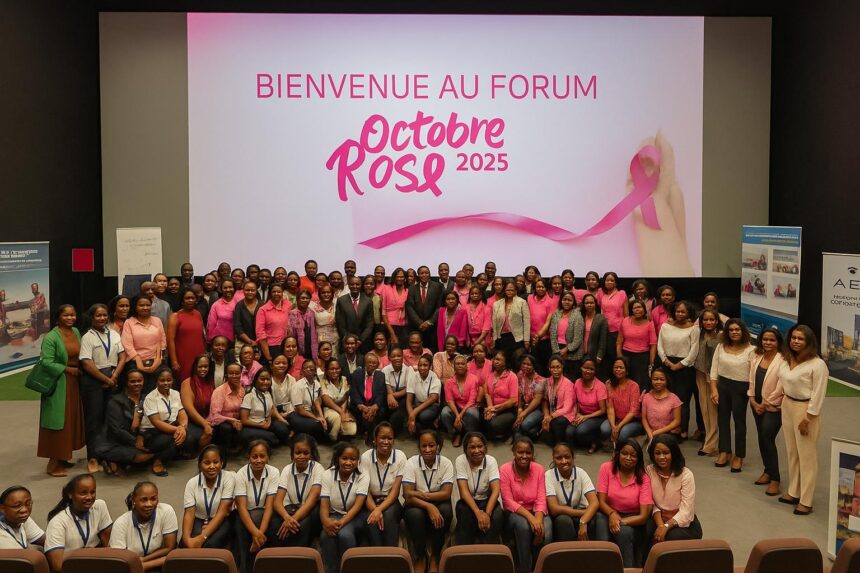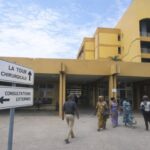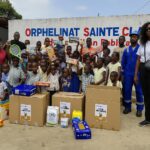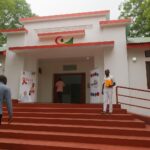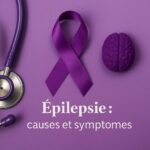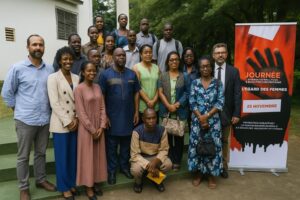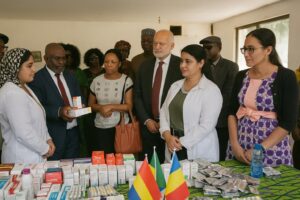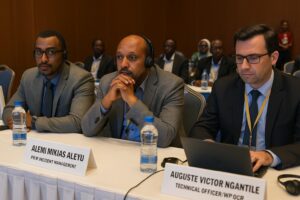Pointe-Noire campuses turn pink for awareness
A wave of pink T-shirts, ribbons and banners swept across the auditorium of École Africaine de Développement in Pointe-Noire on 23 October. Nearly 250 female students from six higher-education institutes gathered for a dynamic breast and cervical cancer awareness forum.
The meeting, staged by Africa Global Logistics Congo and its subsidiary Congo Terminal, marked their annual contribution to Pink October, an international movement encouraging early detection to cut mortality now identified as the leading women’s health threat in low-income nations.
Early screening makes the difference
Breast cancer causes an estimated 685 000 deaths each year, while cervical cancer claims more than 342 000 lives, according to the World Health Organization’s 2023 report, with sub-Saharan Africa carrying a disproportionate burden (WHO 2023).
In Congo, the Ministry of Health records breast cancer as the second most frequent tumour after cervical malignancies, yet only one woman in four has ever undergone a screening exam, a gap experts link to cost, stigma and limited information (Ministry of Health, 2024).
Doctors translate science into action
AGL’s human resources development head, Mayrise Manienze-Mbongo, opened the session with a frank appeal: talking openly, testing early and standing by sufferers can, she said, “save lives long before the hospital does”.
Her words set a respectful tone that carried into the scientific portion led by gynaecologist Dr Nzikou Boussoukou and general practitioner Dr Jennifer Mavoungou, who translated clinical vocabulary into clear instructions on risk factors, warning signs and treatment pathways available in Pointe-Noire.
Learning the self-exam step by step
Dr Boussoukou reminded the hall that a lump smaller than a pea can be detected months before pain appears if women perform self-exams regularly, emphasising that stage-one breast cancer boasts a survival rate near 90 percent globally.
Cervical cancer, he added, is almost entirely preventable through the human papillomavirus vaccine and routine visual inspection with acetic acid, a low-cost method already adopted in several Congolese public hospitals since 2022.
The most practical segment came when midwife Damil Kinguedi invited volunteers onstage, demonstrating the circular motion and pressure points of breast self-palpation using silicone models, then asking each student to repeat the gesture until technique and confidence aligned.
Whispers turned into applause as hesitant smiles spread, a sign that taboo was giving way to curiosity; Kinguedi urged participants to share the method with mothers, sisters and neighbours, turning personal knowledge into a community safety net.
Stories that move hearts and minds
An emotional hush followed a video montage of Congolese families who lost loved ones; several students wiped tears while a classmate recounted losing her aunt at 34 after ignoring a painless lump for a year.
“Hearing that story makes the disease real,” said economics major Christelle Mbemba outside the hall. “I am going to get screened next week and take my cousins with me.” The declaration drew nods from friends clutching the pink information booklets.
Business joins the national health push
While the campaign targeted students, AGL Congo’s country director, Guénolé Koch, stressed that logistics operators also bear responsibility toward dockworkers and truck drivers, groups that often miss medical appointments because of shift patterns or cost.
He confirmed the company will sponsor mobile screening units during the first quarter of 2026, in cooperation with Pointe-Noire’s regional health directorate, aiming to reach 4 000 women employed on or near the port platform.
Such private initiatives fall in line with the national cancer control plan, launched in 2021 under the guidance of the government and supported by the First Lady’s Foundation, which prioritises awareness and low-cost screening in schools, markets and workplaces.
Dr François Ifoko, oncologist at the Loandjili General Hospital, believes partnerships with companies can halve logistical costs for outreach teams. “When firms lend buses, tents or sound equipment, nurses can focus funds on test kits,” he said during a phone interview.
Where and how to get screened
The Pointe-Noire event also addressed male engagement. Students were urged to relay information to boyfriends and brothers, challenging the notion that women’s cancers are exclusively a women’s issue; early detection often depends on someone else noticing a change.
For those seeking screening, the regional hospital in Nkouikou offers free breast exams every Thursday, while the Catholic Mission Clinic in Tié-Tié provides Pap smears at a reduced rate of 5 000 FCFA during October, part of a nationwide subsidy.
Digital momentum keeps message alive
Back on campus, organisers closed the session with a group photo beneath a banner reading “My health, my future.” The image quickly circulated on Telegram and Instagram, pushing the message far beyond the lecture hall and reminding many more young Congolese women that prevention starts now.
Congo Terminal’s communication team will extend the campaign to TikTok with short videos subtitled in Kituba and Lingala, featuring doctors answering frequently asked questions in under one minute, a format proved to boost retention among viewers aged 18–24, according to the Digital 2025 survey.
Organisers hope the next statistics published will show more check-ups, fewer funerals.

